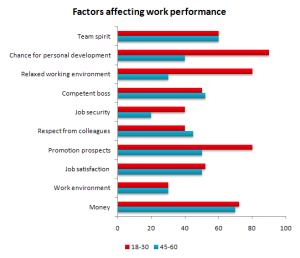Different Workload, Same Work Ethic
Imagine walking into the restaurant, department, or grocery store where you are currently employed. You clock in like normal and set everything up so you can work hard the next few hours. You have lots of energy and you are ready to greet all of the customers coming your way. Then your boss unexpectedly tells you that you will be working a little later that night and will not be allowed to clock out at your usual time. Some customers come in and you offer your services to them, and in return they make a rude remark such as, “Why is a kid helping me?”
Each day, teens who are currently in the workforce are struggling with bosses putting too much pressure on them and adult customers ridiculing them for their young age. These encounters with the public need to be discussed in order to diffuse the growing issue at hand.
Many teens join the workforce, thrilled to be making their own money and feeling very independent and grown up. What a lot of young, new workers do not realize is that their bosses can be taking advantage of them. Some bosses will convince unaware teens to work as much as they can because their establishment is under-staffed and needs the help. They do this without thinking about the well-being of the young adolescent.
“I’m always asked to do all the dirty work and if I request a day off my manager will try to convince me to come into work anyways,” said senior Ashlyn Koby.
In an article by U.S National Library of Medicine, there are many reasons why having a job as a teen is an advantage and a disadvantage. Being employed teaches kids responsibility, independence and good work ethic. On the other hand, teens with too much put on them at work are feeling too overwhelmed.
Some educators find that when students have too much work put on them, it runs them down and makes them not as driven.
“[Teens] come to school tired, have little time to see their teachers after school for help, and avoid extracurricular activities,” said psychologists Bills and Helms.
These things may seem small, but not being able to be more active in school and education may cut short the idea of being a child. Adolescent Moratorium is the concept and stage in a teens life where they are nearing adulthood, but still do not have the stress and responsibilities that adults do. They should be allowed to have this space to be free from too many adult-like pursuits and do normal teen things like playing a sport, joining a school club or hanging out with friends.
On top of being overworked by their bosses, teens are facing their biggest critics of all when they start work… adults. Stereotypes about teens have been all over social media and are even becoming table conversation between closed-minded parents. Every new generation of teens it seems is frowned upon by the older generations that do not like change and would prefer to stick to their good old ways. The current generation continues to fit this mold, especially in the workforce.
“Sometimes it seems like adult customers do not understand that workers, teens especially, are people too,” said senior Kelley Whitehouse.

According to Writing Riot, this graph shows what factors are affecting jobs for students.
The generalization being made by many of the adults today is that the teens of this generation are too lazy and disrespectful to be in the workforce. Mentioned previously, many teens from other generations had this stereotype too. The main difference is that teens are held to a higher standard in today’s age. Teens have to balance school, studying, homework, sports, clubs, and work. The school work that teens are given today is different than when their parents were in school. Subjects have been accelerated and made more difficult, along with heavier workloads. According to NBC news, teens report their stress level to be a 5.8 on a 10 point scale, above the adult stress level of 5.1. Teens will be working longer shifts in order to earn more money or satisfy their parents, which will cause them to head home late at night. When they finally get home, they will have to do all of the homework they were given that day. They will work hard at night and all day and be too exhausted mentally and physically at school.
Being tired will cause a sluggish look and make many feel irritable. Many bosses will take this sleepy demeanor as kids being harsh and immature teens. This is just one of many reasons why adults find teens “impolite.” Taking this impoliteness one step further, some have gone as far as writing articles on how to deal with teen workers when you are their boss.
On the “When I Work” blog, there is an article called, “How To Effectively Manage Teenage Employees.” The article addresses the current issue with the way parents and teachers and bosses talk to teens.
“You can’t tell teens to do something just because you said so, using force, but you must provide a logical reason,” said Chad Halvorson.
The only way there can be any resolution to this problem with teens and working is if adults try to put themselves in their child’s shoes and watch out for signs of excessive overworking. Adults need to think of teens as workers when faced with them, not just some child in a uniform. Teens are not children, nor are they adults. An attempt at growing up is being made when a teen applies for a job. Let us welcome all with open arms for the effort, instead of shooting them down.






